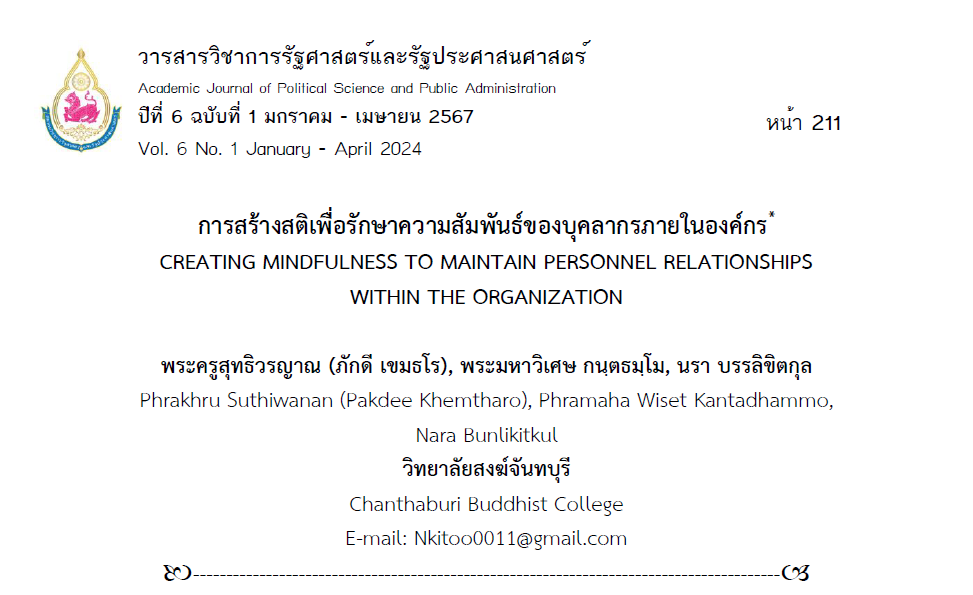การสร้างสติเพื่อรักษาความสัมพันธ์ของบุคลากรภายในองค์กร
คำสำคัญ:
สติ, ความสัมพันธ์, บุคลากรภายในองค์กรบทคัดย่อ
บทความนี้นำเสนอการสร้างความสัมพันธ์ที่ดีในองค์กรโดยนำหลักสติในทางพระพุทธศาสนามาประยุกต์ใช้ พระพุทธเจ้าทรงสอนให้สาวกมีสติทุกอิริยาบถในการกระทำ ทั้งการพูด การทำงานและการดำเนินชีวิต จึงสามารถนำมาประยุกต์ใช้กับการบริหารงานในองค์กรได้ จากความห่างเหินในการทำงานช่วงภาวะวิกฤตของโรคระบาดโควิด 19 ด้วยการลดระยะห่างและการสนทนาแบบพบหน้า ความสัมพันธ์ที่ห่างเหิน บางคนคิดว่าตนทำงานหนักแต่เพียงผู้เดียว มีความรู้สึกไม่สนิทสนมเหมือนเดิมประกอบกับ การเจริญเติบโตทางธุรกิจที่ฟื้นตัว ทำให้รู้สึกงานไม่ก้าวหน้า รวมถึงการไม่เห็นความเปลี่ยนแปลงในองค์กรของตนเอง การใช้หลักสติ เพื่อรักษาความสัมพันธ์ของบุคลากรในองค์กร ให้มีประสิทธิภาพกลับมาเหมือนเดิม เริ่มจาก 1. การใช้สติในการสนทนา โดยมองจากความคิด ความรู้สึกของตนเอง 2. รู้จักระวังความคิด ความรู้สึกของเพื่อนร่วมงาน 3. การใช้สติเพื่อการสื่อสารอย่างเปิดเผยตรงไปตรงมา 4. การฝึกให้รู้จักการทำงานร่วมกัน ด้วยความสามัคคี 5. การสร้างความเชื่อมั่น ด้วยการใช้สติในการแสดงออก เพื่อบ่งบอกถึงภาวะความเป็นผู้นำ ทั้ง 5 ข้อนี้เป็นแนวทางพื้นฐานเพื่อนำไปใช้ปฏิบัติในการสร้างความสัมพันธ์ที่ดีแก่บุคลากรให้เกิดความสามัคคี เคารพให้เกียรติกัน ยอมรับฟังคำแนะนำ ติชม ด้วยความคิดเชิงบวก อันจะนำมาซึ่งองค์กรที่มีประสิทธิภาพและภาพลักษณ์ที่ดีต่อไป
เอกสารอ้างอิง
เทียนศรี บางม่วงงาม. (2562). ปัจจัยที่มีความสัมพันธ์ต่อความผูกพันต่อองค์กรของบุคลากรที่ผ่านโครงการอบรม วิศวกรใหม่ กรณีศึกษา: บริษัทเอกชนแห่งหนึ่งในเขตกรุงเทพมหานคร (ศิลปศาสตรมหาบัณฑิต สาขาวิชาการบริหารจัดการองค์การ). กรุงเทพฯ: มหาวิทยาลัยเกริก.
ธานี วรภัทร์. (2563). การสร้าง “สติ” ในการเปลี่ยนความคิดและพฤติกรรมนักโทษในต่างประเทศ. วารสารนิติศาสตร์ปรีดี พนมยงค์, 1(3), 115-148.
นันทพร ทองลิ้ม. (2563). ผลกระทบของสัมพันธภาพในที่ทำงานและความไม่มั่นคงในงาน ต่อความตั้งใจลาออกจากงาน ผ่านความสุขในการทำงาน (บริหารธุรกิจมหาบัณฑิต สาขาวิชาหลักสูตรบริหารธุรกิจมหาบัณฑิต). กรุงเทพฯ: มหาวิทยาลัยศิลปากร.
พานทิพย์ แสงประเสริฐ. (2561). ผลของการฝึกสติต่อพฤติกรรมสุขภาพและคุณภาพชีวิต ในผู้ป่วยโรคความดันโลหิตสูง (ปรัชญาดุษฎีบัณฑิต สาขาวิชาเวชศาสตร์ชุมชนและเวชศาสตร์ครอบครัว). กรุงเทพฯ: มหาวิทยาลัยธรรมศาสตร์.
มหาจุฬาลงกรณราชวิทยาลัย. (2539). พระไตรปิฎกฉบับภาษาไทย ฉบับมหาจุฬาลงกรณราชวิทยาลัย. กรุงเทพฯ: โรงพิมพ์มหาจุฬาลงกรณราชวิทยาลัย.
มาริสา อุทยาพงษ์. (2560). การประยุกต์ใช้การเจริญสติ เพื่อป้องกันผู้ที่มีภาวะซึมเศร้า. วารสารบัณฑิตศึกษาปริทรรศน์, 13(2), 109-122.
ยงยุทธ์ วงศ์ภิรมย์ศาสนติ์. (2560). สร้างสุขด้วยสติในองค์กร (พิมพ์ครั้งที่ 4). นนทบุรี: บียอนด์ พับลิชชิ่ง.
รวิศ หาญอุตสาหะ. (2566). 4 วิธีช่วยสร้างความสัมพันธ์ที่ดีให้คนในองค์กร. สืบค้น 28 สิงหาคม 2566, จาก https://www.krungsri.com/th/plearn-plearn/4-way-building-relationship-work
เรือนขวัญ อยู่สบาย. (2561). ความสัมพันธ์ระหว่างปัจจัยสร้างความผูกพัน ระดับความผูกพัน และผลงานของพนักงาน : กรณีศึกษา บริษัท NMO จำกัด. วารสารปัญญาภิวัฒน์, 10(1), 121-133.
วิภาวรรณ เส็งสาย. (2561). ความสัมพันธ์เชิงสาเหตุของปัจจัยบางประการที่ส่งผลต่อประสิทธิภาพการทำงานของพนักงานใน บริษัทผู้ผลิตเครื่องดื่มแห่งหนึ่งในพื้นที่จังหวัดนครปฐม (บริหารธุรกิจมหาบัณฑิต สาขาหลักสูตรบริหารธุรกิจมหาบัณฑิต). กรุงเทพฯ: มหาวิทยาลัยศิลปากร.
สุพริศร์ สุวรรณิก. (2566, 17 มิถุนายน). Mindfulness: พลังแห่งความระลึกรู้. ไทยรัฐ. น. 6.
สุรเกียรติ อาชานานุภาพ. (2561). “สมองหน้าพาเติบใหญ่” ด้วย “หมั่นฝึกสติเป็นนิสัย” วารสารหมอชาวบ้าน, 40(470), 6-8.
สุรวัฒน์ เสรีวิวัฒนา. (2555). ฝึกสติให้จิตตั้งมั่น ฝึกสติให้เกิดปัญญา. กรุงเทพฯ: สำนักพิมพ์สุภา.
สุวัฒน์ ธนกรนุวัฒน์ และคณะ. (2562). การเจริญสติในวิถีพุทธจิตวิทยา. วารสาร มจร มนุษยศาสตรปริทรรศน์, 5(2), 185-197.
อินทิรา ปัทมินทร. (2557). หลักสูตรและแผนการสอน เรื่อง การพัฒนาสติเพื่อสุขภาพ. กรุงเทพฯ: กรมสุขภาพจิต.
Jeanne Meister. (2023). Four Principles for Successful Hybrid Working. สืบค้น 28 สิงหาคม 2566 จาก https://www.forbes.com/sites/jeannemeister/2023/06/30/four-principles-for-successful-hybrid-working/?sh=3fda81155f13
Laura, S. (2020). 11 ways to make a success of hybrid work. สืบค้น28 สิงหาคม 2566, จาก https://minthr.com/blog/hybrid-work/#:~:text=
Establish%20a%20culture%20of%20trust,when%20they%20need%20that%20support.

ดาวน์โหลด
เผยแพร่แล้ว
รูปแบบการอ้างอิง
ฉบับ
ประเภทบทความ
หมวดหมู่
สัญญาอนุญาต
ลิขสิทธิ์ (c) 2024 วารสารวิชาการรัฐศาสตร์และรัฐประศาสนศาสตร์

อนุญาตภายใต้เงื่อนไข Creative Commons Attribution-NonCommercial-NoDerivatives 4.0 International License.




